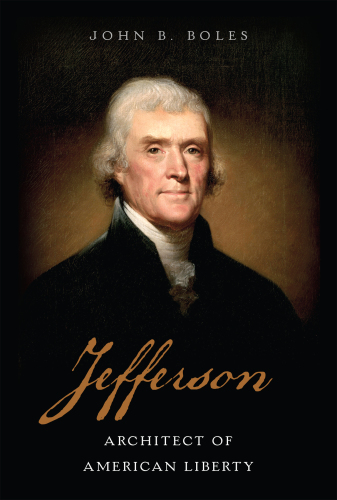
Jefferson
Architect of American Liberty
- اطلاعات
- نقد و بررسی
- دیدگاه کاربران
نقد و بررسی

March 13, 2017
In a narrative as majestic as its subject, Boles (University Builder), professor of history at Rice University, takes a fresh, nuanced look at one of the America’s most enigmatic founding fathers. With scads of books already available about Jefferson, Boles’s work distinguishes itself in two ways. First, it’s a “full-scale” biography, covering all facets of Jefferson’s life: politician, oenophile, father. The prose moves smoothly and efficiently among the various parts of Jefferson’s life, lingering only long enough to get each particular story told. Boles judiciously selects events that highlight his subject’s personality. For instance, when Jefferson stepped down as governor of Virginia in 1781, the state assembly launched an inquiry into how effectively he’d served in office. The charge cut him so deeply that he turned down the chance to negotiate the Paris Peace Treaty so he could defend himself. Second, Boles declined to apply 21st-century sensibilities to Jefferson’s life: “Instead, we should try to understand the constraints—legal, financial, personal, intellectual—under which he lived.” Boles, an accomplished scholar well versed in the source material, deftly paints a picture of the world as Jefferson knew it, taking care not to mix up understanding with excusing, especially with the Virginian’s relationship with Sally Hemings. This is a gem of a biography. Illus.

March 1, 2017
A fully fleshed biography of Thomas Jefferson (1743-1826) that emphasizes his creative paradoxes and accomplishments.As presented by Boles (History/Rice Univ.; University Builder: Edgar Odell Lovett and the Founding of the Rice Institute, 2007, etc.), Jefferson, "in all his guises," displayed an industrious commitment to public service in the young republic, passionate devotion to personal relationships and copious letter writing, and dedication to his state and Monticello homestead. Above all, Jefferson possessed enormous intellectual curiosity, starting from his studies of philosophy and science at the College of William and Mary, and later law, continuing through his years living in Paris as commissioner and later secretary of state, and climaxing in his creation of the University of Virginia. Boles elegantly delineates the milestones of Jefferson's life and the expression of his mind--e.g., in the writing of the Declaration of Independence, in which, "with consummate artistry, [he] summarized years of thinking and political philosophizing in about two hundred words." A man of his time, Jefferson was steeped in the revolutionary ideals of the Enlightenment, such as the need for religious tolerance and the belief (ultimately struck from the Declaration) that slaves "had rights identical to those of the rest of the American people"--and yet he notoriously held on to his own slaves. Boles treats Jefferson's relationship with his young slave Sally Hemings with the same discretion that Jefferson did, though after she bore him five children, the secret was certainly well-known, both at Monticello and publicly. Curiously, Jefferson never traveled farther than 50 miles west of Monticello, yet as president, he was obsessed with America's western expansion and famously secured the Louisiana Purchase. The author devotes a chapter to Jefferson's "Living with Paradox" and reminds readers not to judge the sage of Monticello by 21st-century terms. Still, regarding emancipation, "in no other aspect of his life does Jefferson seem more distant from us or more disappointing." A stately, knowledgeable study jostling for space among the groaning bookshelves devoted to the third president.
COPYRIGHT(2017) Kirkus Reviews, ALL RIGHTS RESERVED.

April 15, 2017
Boles (history, Rice Univ.) portrays a Thomas Jefferson (1743-1826) motivated by an unwavering fervor for liberty and the protection of the republic and a fear of despotism. Thoroughly discussed are the political and personal: Jefferson's disputes with Alexander Hamilton and Aaron Burr; his thoughts on religion; his relationship with his enslaved servant Sally Hemmings; and the legal, societal, and economic complications of manumission. Boles argues that deeming Jefferson as a hypocrite from a 21st-century perspective is unrealistic and robs the president of his position as the utmost defender and architect of liberty. Jefferson's great loves were farming, family, architecture, and study, but he was drawn to serve his country in order to protect the freedoms he so steadfastly valued. Boles demonstrates that many of Jefferson's successes were owing to his conciliatory and noncombative nature. His most cherished accomplishments were writing the Declaration of Independence, defending the Virginia Statute for Religious Freedom, and founding the University of Virginia. VERDICT For all readers interested in understanding the enigmatic and controversial Jefferson as well as his shortcomings and triumphs within the context of his time.--Margaret Kappanadze, Elmira Coll. Lib., NY
Copyright 2017 Library Journal, LLC Used with permission.

May 1, 2017
For many decades, the historical narrative concerning the third president of the U.S. ran along the lines of greatness as chief executive. Current scholarly thought often counters that opinion, and a bit of tarnish has attached itself to his name, arising from what many recent biographers identify as the tragic hypocrisy of Jefferson's inclusion in the Declaration of Independence, of which he is credited with primary authorship, of the ringing phrase, all men are created equal, while he was a long-time slaveholder. Are we, then, to simply abandon our belief in Jefferson's greatness? A balanced appraisal is called for, and historian Boles' elegant, highly incisive new biography suits the need very well. The detail is impressive, equally so the fluidity of the presentation. The reader is enveloped in Jefferson's world, which, for this author, is the key to sorting through with judicious eyes Jefferson's tangle of apparent contradictions, because to understand certainly does not mean to approve or even forgive; rather, it means to comprehend why Jefferson made the kind of decisions he made and see the world as he did. (Reprinted with permission of Booklist, copyright 2017, American Library Association.)




دیدگاه کاربران